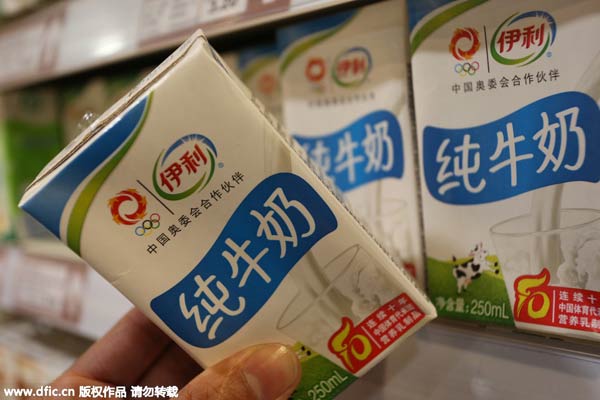Yili Group milks world of industry experience
By Wang Zhuoqiong/Yuan Hui (China Daily) Updated: 2015-03-31 07:32Editor's note: An increasing number of Chinese companies are emerging on the world stage as they strive to establish their brands outside the country. China Daily reporters asked the heads of some of the best-known how they present themselves overseas, how they compete against their global counterparts and how they might use lessons learned from their multinational rivals. This report, the first in our series, is by Wang Zhuoqiong and Yuan Hui in Hohhot.
 |
|
Chinese customer shops for a carton of Yili pure milk at a supermarket in Xuchang city, Central China's Hunan province, November 16, 14. [Photo/IC] |
Alongside a piece of armor from the movie Iron Man in a dairy museum in Hohhot are models of cows and equipment used in milk production.
The items on display represent a clever product placement by dairy giant Inner Mongolia Yili Industrial Group Co Ltd within the blockbuster franchise by The Walt Disney Co, which has drawn wide attention from Chinese viewers. And it is a prime example of how the dairy producer is leveraging global resources to increase its share of the domestic market and cultivate a strong Chinese brand overseas.
The company is expected to step up collaboration with leading world dairy suppliers, farms and institutions to lower costs, improve resources and hedge against fluctuations in global milk prices, according to its top official.
Executive President Zhang Jianqiu said in an interview with China Daily on Monday that Yili's overseas investment decisions are based on an evaluation of how such moves can improve its product portfolio and production capacity.
"With the focus on capacity upgrades and research and development, moves to go global have fueled Yili's innovation and product diversification," he said.
Last year, it was cheaper to source from abroad than from domestic farms. A kilogram of milk on average costs 2.4 yuan (39 cents) in New Zealand, half the cost of buying within China, he said. Also, Western dairy farms have an established history of quality.
Hedging against the fluctuation of global dairy prices is another incentive for Yili to go abroad.
"We collect 10,000 metric tons of milk daily," said Zhang. "We have to be able compete against global dairy players."
Chinese dairy companies are making an increasingly significant impact on the global industry, said Zhang. Yili's goal is to become top five dairy brand in the world by 2020.
The company was listed by the Netherlands-based bank Rabobank Group as the first Asian dairy producer to reach the top 10 last year.
Relatively low per capita milk consumption in China offers room to grow for foreign and domestic dairy players. Per capita milk consumption in 2014 in China was 14.3 liters, one-third of the level in Japan and one-fifth that in the United States-and that is despite a tripling of consumption since 2004.
Since a 2008 scandal in which melamine was added to milk powder, sickening about 200,000 infants and killing several, Chinese consumers have grown more cautious about domestic dairy products, particularly in the infant formula sector, creating massive opportunities for foreign brands.
- Israel requests to join Asian Infrastructure Investment Bank
- Chinese stocks rebound on April 1
- China, the West in Africa: more room for cooperation than competition
- Nanjing cuts taxi franchise fees
- Air China increases flights to Milan, Paris
- JD.com raises delivery charges
- Veteran corporate strategist upbeat about China economy
- L'Oreal China sales revenue up 7.7% in 2014

















